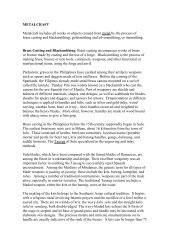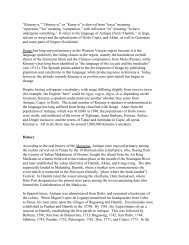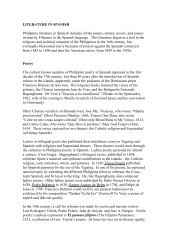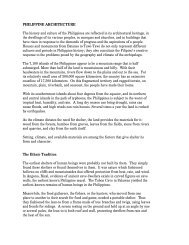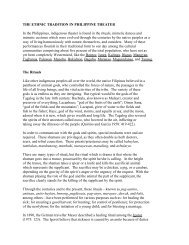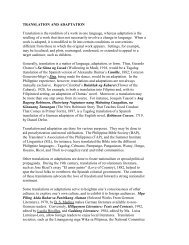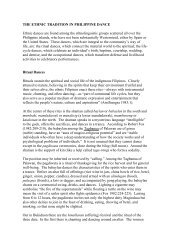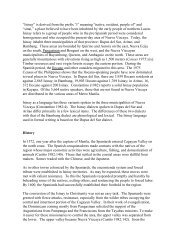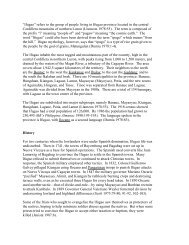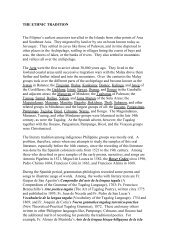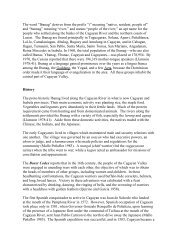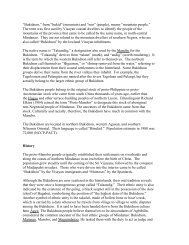The Tboli, also known as T'boli, Tiboli, and Tagabili, are an old ...
The Tboli, also known as T'boli, Tiboli, and Tagabili, are an old ...
The Tboli, also known as T'boli, Tiboli, and Tagabili, are an old ...
You also want an ePaper? Increase the reach of your titles
YUMPU automatically turns print PDFs into web optimized ePapers that Google loves.
domestic <strong>an</strong>imals, the most distinctive being horses, which enjoy a singular stature.<br />
Possession of horses is <strong>an</strong> indicator of fin<strong>an</strong>cial <strong><strong>an</strong>d</strong> social prestige. Much of the<br />
produce is kept for the use of the househ<strong>old</strong>; some to barter with certain necessities,<br />
like salt. <strong>The</strong> <strong>Tboli</strong> <strong>are</strong> <strong>also</strong> skilled in textile weaving <strong><strong>an</strong>d</strong> metalwork which enable<br />
them to produce the distinctive <strong>Tboli</strong> cloth <strong>known</strong> <strong>as</strong> tnalak <strong><strong>an</strong>d</strong> various metal<br />
artifacts r<strong>an</strong>ging from swords to musical instruments <strong><strong>an</strong>d</strong> figurines.<br />
Progressive contact with Christi<strong>an</strong> lowl<strong><strong>an</strong>d</strong>ers patterns <strong>Tboli</strong> life. Incre<strong>as</strong>ingly, <strong>Tboli</strong><br />
hunting grounds have been constricted by exp<strong><strong>an</strong>d</strong>ing Christi<strong>an</strong> communities in the<br />
lowl<strong><strong>an</strong>d</strong>s. Barter is <strong>also</strong> giving way to a money economy. Househ<strong>old</strong> utensils,<br />
cosmetics, <strong><strong>an</strong>d</strong> certain fabrics <strong>are</strong> already being bought from stores in the lowl<strong><strong>an</strong>d</strong>s,<br />
rather th<strong>an</strong> made by the <strong>Tboli</strong> househ<strong>old</strong>s or bartered from other tribes. Lately, the<br />
sale of <strong>Tboli</strong> products h<strong>as</strong> become a profitable business; the products <strong>are</strong> s<strong>old</strong> to<br />
tourists or sent to outlets around the country.<br />
Pressure h<strong>as</strong> <strong>also</strong> been brought to bear upon the <strong>Tboli</strong> to open up their l<strong><strong>an</strong>d</strong>s to<br />
contract-growing schemes for pineapple <strong><strong>an</strong>d</strong> other c<strong>as</strong>h crops, a strategy adopted by<br />
the local government for lowl<strong><strong>an</strong>d</strong> Christi<strong>an</strong> farmers who have either ab<strong><strong>an</strong>d</strong>oned their<br />
traditional crops or become employees of gi<strong>an</strong>t multinational fruit comp<strong>an</strong>ies like<br />
Del Monte. <strong>The</strong> upl<strong><strong>an</strong>d</strong> climate <strong><strong>an</strong>d</strong> soil of the <strong>Tboli</strong> homel<strong><strong>an</strong>d</strong>s have been determined<br />
to be suitable for pineapple, coffee, <strong><strong>an</strong>d</strong> cacao.<br />
Political System<br />
<strong>The</strong> concept of the village is nonexistent since every house or househ<strong>old</strong> cluster<br />
operates rather independently, except during marriage <strong><strong>an</strong>d</strong> funeral fe<strong>as</strong>ts. <strong>The</strong> <strong>Tboli</strong><br />
have the datu (chieftain) to whom people go for interpretations of <strong>Tboli</strong> customs <strong><strong>an</strong>d</strong><br />
traditions <strong><strong>an</strong>d</strong> for the settlement of intertribal disputes. Wisdom <strong><strong>an</strong>d</strong> a proficiency in<br />
the knowledge of <strong>Tboli</strong> traditions <strong>are</strong> the deciding factors that make litig<strong>an</strong>ts consult<br />
one datu <strong><strong>an</strong>d</strong> not the other. <strong>The</strong> position of datu is not hereditary. One datu does not<br />
enjoy primacy over the others, nor does he exercise specific jurisdictional control over<br />
specific <strong>are</strong><strong>as</strong> or groups. Other datu might accord deferential treatment to one of their<br />
members, but this is not a sign of his superiority over them.<br />
<strong>The</strong> <strong>Tboli</strong> <strong>are</strong> governed through a rich layer of custom law <strong><strong>an</strong>d</strong> tradition. <strong>The</strong>re is no<br />
body of written laws nor do the datu rule by decree. Custom law <strong><strong>an</strong>d</strong> tradition <strong>are</strong><br />
usually inculcated among the <strong>Tboli</strong> in the numerous folktales <strong><strong>an</strong>d</strong> folk beliefs that <strong>are</strong><br />
tr<strong>an</strong>smitted orally from childhood. Tr<strong>an</strong>sgressions of the custom law or sala do not<br />
have a corresponding penalty in the penological sense. Rather, offenses <strong>are</strong> penalized<br />
by tamok (fines). If unable to pay the tamok, which is usually in the form of l<strong><strong>an</strong>d</strong>,<br />
horses, cattle, money, or other movable or immovable property, the offender must<br />
render service to the aggrieved party for a period of time.<br />
Grave felonies <strong><strong>an</strong>d</strong> tr<strong>an</strong>sgressions of custom law which would bring harm to the<br />
community c<strong>an</strong> be punished by ostracism <strong><strong>an</strong>d</strong>, in extreme c<strong>as</strong>es, death. Furthermore,



